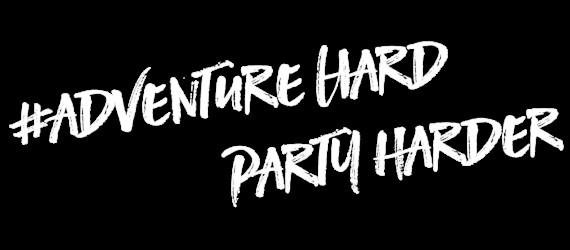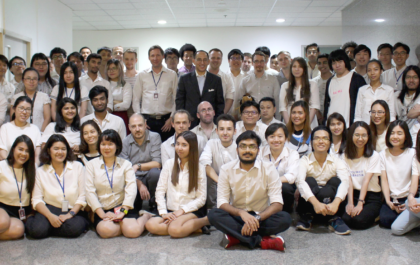Slumber Party is probably the best known name among Hostels in Thailand. Started in Ao Nang, Krabi in 2012, It now has branches in Bangkok, Koh Phangan, Phuket, Lombok and Bali with many more on the way. While “Adventure hard and Party harder” is its motto, equally important if not more so is its creator Edmund’s mission, which is to give back to the community. To that end, Slumber Party organizes beach clean ups, arranges charity events like marathons and free concerts and awards scholarships to underprivileged children.
If passion really is the currency of the future, as Edmund says, then he definitely has loads of it.
Genup: Tell us about yourself.
Edmund: My name is Edmund, I’m 38 and from Florida. My education is actually pretty minimal. I went to grade school up through high school. Struggled through high school. Barely graduated, would be the truth. Was heavily into sports in high school. Running, which I’m still into today. I’m a very active runner and training for Ironman actually at the moment. Made it out of there, went to a semester of college. In high school I was a very active musician. I ended up joining a band that had a good amount of success in America. Made some money from that, and then after I’d made some money from that I started traveling and went to Europe. Spent about two and a half years in Europe just kind of messing around. Then went from there to China. Started a fashion company with some friends of mine in China. Sold that company in 2015, ’16 area. I came actually to Thailand in 2012. After I had been to Thailand I sold the business, had a bit of money, started Slumber Party hostels. Which wasn’t very much money. And then the rest is history as they say.

Genup: Why did you decide to choose the path of entrepreneurship? What was the initial spark?
Edmund: I think I’m unemployable. I didn’t have a choice, would be the answer. That’s the truth. I don’t really deal well, even now, I don’t really deal well with authority. I don’t deal well with other people forcing their rules. I hate rules. I can’t say I hate rules, that’s not true. I always like to look at them differently… A better way to say this is I always like to look at the perceived norm, whatever the rules and regulations are around that and see, if there is a way to do that differently? Is there a way to improve this? Is there a way to make it more efficient? Which I guess some people would look at as, “Oh. They like to break the rules.” Or, “Oh. They like to go against the grain.” But it’s not really that. It’s like, I like to push for improvement, efficiency, changes to see if there’s a better way to do things.
Genup: Looking at things in a different way… that’s like a lot of entrepreneurs, a lot of us are actually creators, right?
Edmund: Yeah. Absolutely. And I would say that again goes back to music, right? I’m a very creative person. I like art, I like music, I like anything that’s design, anything that’s creation based, or problem solving based, that requires creative thinking. I’m definitely a creative thinker.
Genup: Is this your first business?
Edmund: No. No. No. I’ve had several. A bunch. I have several right now as well, and I’ve had several before.
Yeah. I’ve only really had maybe I would say one maybe two jobs really in my life. Even after high school, I was always scheming and trying to find ways to make money. I guess I was a hustler. I used to sell candy bars out of my locker in high school. I’d go to the grocery store… I basically found out at high school. I don’t know what the high schools are like in Thailand, but in America, you go into the high school, especially a private school, and they have these cantinas, that’s where everyone eats lunch. And all the candy and the cookies in there, there’s a massive markup on them. But if you would go to the local grocery store and buy the same thing. It’s much cheaper. You can get a 60% discount. So I went and bought a bunch and put it in my locker. And I would sell it to all the kids for 20%, 30% cheaper than what they would sell at the cantina. That’s how I bought my first car. Yeah. I sold that much candy. $5000 worth of candy and donuts. It was great. So yeah, it was in the blood. I always liked money and I always liked finding ways to make money.
Genup:Tell us a bit about your business.
Edmund: Right now there’s two things I’m focused on, but really it’s all under the same umbrella which is Slumber Party Holdings. Slumber Party is a youth hostel. We’re very focused on food and drinks. We’re very F&B driven business. We’re very tour driven business. About 60% of our income, 60-70% of our income depending on the property is F&B and tour driven. The room part of the business is actually a very small portion of the business. So I would say what we’ve done is taken the traditional hotel model and kind of flipped it upside down.
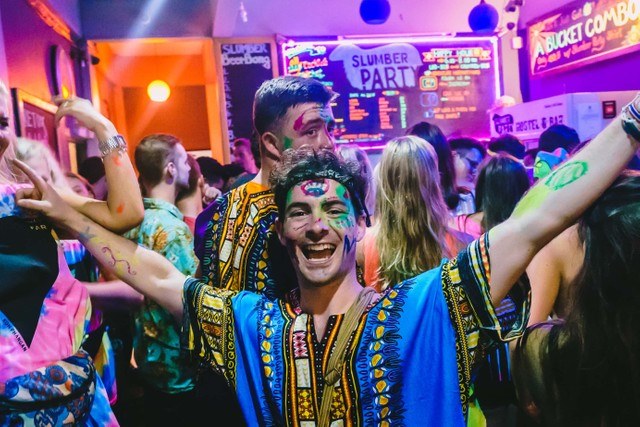
The traditional hotel, they’re only concerned about room rate. How can they maximize ADR? How can they maximize occupancy? Revpar is part of our concern as well but ADR is not such a concern for us. If I have a great daily rate, that’s great, if I don’t have a great daily rate, that’s okay for me as well. Because my main objective is, can I fill my property? If I fill my property, then I’m making money because our conversion of guest from person sleeping in a bed into person drinking in a bar is very high. I would say we convert around 65% of our customers into drinking customers. Whereas a traditional hotel, these guys are converting maybe 15%. In some cases, 7%. Yeah. More incredible is, speaking of Krabi, our first location, particularly in that market, our property is not very nice there. I think that’s kind of how we cut our teeth so to speak, and learned our business was because when we took that property, it almost eight years ago now, that property was on the outside of town. It was in the middle of nowhere. When I took that over, I remember telling people I was going to open something there and people were going, “You’re crazy. That is so far outside of town. You are going to go out of business in a week.” And I think because failure wasn’t an option, I had to figure out a way make it work. I just figured I’d just hustle and make it work. And because of having this property that wasn’t that great, it taught us a lot about how to be good operators when you’re constricted by facilities or quality. Because as I said, at that time we didn’t have much money, built a very cheap hostel but what it taught us was how to offer great customer service, how to offer exceptional F&B experiences, how to provide great tour experiences that was different from what everyone else was doing, because we couldn’t charge. It wasn’t that I was some genius that I came up with this model of flipping it upside down. I think I was forced into it. I didn’t have the money to open up a nice hotel, so I couldn’t charge a lot for my rooms. So, I had to figure out a way to make money.
So the only way I could figure out how to make money was if I could fill the rooms, I could sell tours, and I could sell alcohol. And then I was like, “Oh wow. This is a good model.” And then of course now we have started expanding it and improving it. The Slumber Party’s we are opening today are definitely some of the nicest hostels out there. If you look at the things, we’re opening in Bali they’re incredibly nice. They’re definitely the nicer hostels, if not the nicest hostels in the market. Then in addition to that, the other thing we’ve done I think quite well with Slumber Party is we’ve given back a lot to the community. In Krabi specifically, we help organize each year the Ao-Nang Beat music festival. No actual cash benefit to us on doing this event. Takes a lot of time and energy. We put the whole proposal together. We have about 10,000 attendees to the concert each year. It usually happens in May on the beach. This will be the third year now. And then there’s also a hospital run that we do each year with the Krabi hospital to raise money. We do a Ao-Nang run for kids that we do each year.
Beyond that, yes, we’re a party place in that people looking at us go, “Oh. It’s this crazy party place.” But if you look under the curtain a little bit we actually do a lot, a lot, a lot of community service. And try to donate a lot back to Krabi specifically, more than any other market in Thailand. You can actually see. Look. See that? I actually have goosebumps thinking about it. I kid you not. I have goosebumps thinking about it because it all started in Krabi. It started with me sleeping behind a reception and I get literally goosebumps when I think about it because eight years later, I’m building 130 room hotels. So Krabi specifically has a really, really, really special place in my heart. And I try to do everything I can to boost up Krabi and to donate money to Krabi and anything in Krabi, I just have a soft spot for it. Krabi is my heart. I always want to do anything I can to boost that town up.

So yeah, that’s Slumber Party. And then we have Socialtel that were just about to launch. The first one we’re opening is in Koh Samui in July. And that, kind of the way we’ve looked at it is what’s the next step in our customers journey? We started thinking after a few years of running Slumber Party you see the guests come back year after year. And then at some point you stop seeing them. Once they hit 30, 35, they get a bit older and we don’t make sense to them anymore. They still like the social environment but the social environment to the degree which we offer may be a bit too much. And then I started to think to myself, “Okay. We’re here in Four Points today. Is that person going straight from Slumber Party to Four Points?” I don’t think so. I think that’s too big of a jump. I think there’s something in between there. And so then I started looking around and was like, “There’s not really much offered on the market that is that in-between step.” Maybe Ibis, but it’s not social at all. Maybe if they go to an Airbnb. Maybe they stay at some place like a Lup Dee maybe. They’re trying to go to the social side of business but still not as social as we are. And I just was like, “Wow. There’s a really big gap in the market here. From like the 30-year-old to the 40-year-old, potentially.” It’s time when you’re kind of starting to make money. You have your first or second position in that company, you have a bit but you’re still not willing to go spend $150-200 a night for a room. They still want to party a bit, but they don’t want to go crazy, and so that’s kind of the concept of Socialtel, It is a lifestyle brand. Funky, cool design. Really cool F&B outlets. Trying to keep it social but pull it back a little bit.
Genup: So you kind of moved them along, I guess like Old Navy to The Gap and then to Banana Republic
Edmund: Yeah. Exactly. Exactly. It’s a marketing funnel. Right? So, if I look at hotels, you have the Ritz Carlton or St. Regis on top? It’s like the end of the marketing funnel for a hotel, right? Very few people are going to trickle all the way down into those two brands. Sure, some people will just enter into there. Probably they’re picking them up at the bottom, as their wealth increases, they are progressively going through the funnel. As it stands right now, no major hospitality companies have an entry level hostel. And that’s where the customers journey starts. Starwood, or Marriott now, Accor, they’re all fighting for the same customers once they hit 25 or 30. But at 18 you can grab them. And that’s kind of like, my thought is, I’m going to build a company as big as them. Why can’t I? I already have them in my hand. At 18 I already have these guys. I can build brand loyalty at 18, they’re trying to build brand loyalty at 25 to 30. So it’s kind of our thought.
Genup: What type of marketing channels do you use?
Edmund: Of course, the traditional OTA’s, or online travel agencies, all the main booking sites. We do a lot of Facebook marketing. We do a lot of content marketing, so putting out blogs and videos. We try to encourage word of mouth marketing. Actually, with the backpackers specifically, think the word of mouth marketing is the most powerful. So, by giving away shirts, hats, whatever to encourage people to actually talk about the brand. What else? Partnerships during marketing alliances, doing some marketing alliances with some other hostels where we don’t have a presence so that they can do cross bookings and also do loyalty programs with different hostels. We’re actually just starting to build that up.

I think the content marketing is also a big part. Producing blogs and videos. We used to do, we’re actually about to launch it again, we used to do this really great series called A Thousand Baht a Day. And we just had a personality, a girl, that would go around Thailand and we sent her and a videographer to all the markets where we had hostels, and markets where we didn’t have hostels. And we would tell a backpacker and give them an instructional video on how they could spend a thousand Baht a day. Because that’s actually, when we looked at our customers, most of them were spending 1,000 to maybe 2,000 Baht a day, max. That’s their average spend per day in Thailand. So, we went and created a video series. “This is all the things you can do in this city for 1,000 Baht a day.”
So, we launched those on YouTube. Those were really successful. And then we ran YouTube ads against those videos to try to draw people to the videos or get on other hostel videos to try to pull people onto our website. Besides maybe one other hostel that I can think of in Asia, I think we probably have one of the best email funnels, meaning that once someone books a hostel with us we spend a lot of time and money building out our email funnels that they get certain offers throughout their stay. They get a reminder email after they’ve left, to try to book again. If they’ve gone to the booking page on our site and they don’t book, they’ll get prompted an email or they’ll get a banner ad on the next website they’re on for Slumber Party.
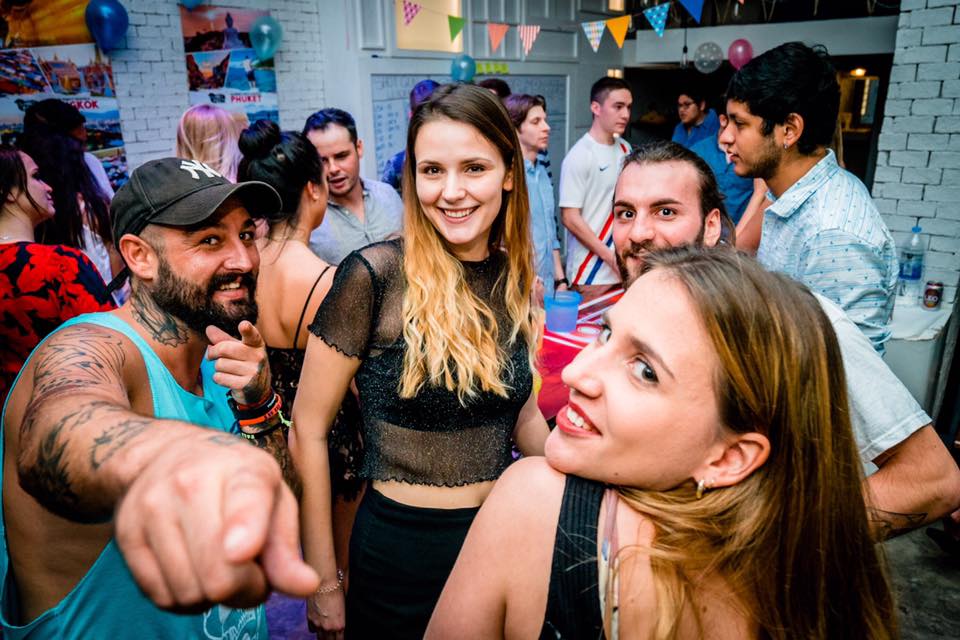
Genup: Do you do all this in-house or have you hired an outside firm?
Edmund: Actually, when we built out our re-targeting funnel and we built out the email funnel, we hired a consultant to help us build it out. A really good friend of mine was actually ex-Facebook, he was employee number 30 at Facebook. Lucky guy. So a very good friend was employee number 30 at Facebook. He has since opened up a bunch of other companies, and he introduced me to this guy, who he was like, “This is the best email marketing guy on the planet.” So, it was expensive, but it’s been really good.
When we worked with him, we had a few options. He’s like, “You can pay me, and I’ll build out everything and I’ll give you the strategy, or I can give you the strategy and you can have someone build it out.” We went with the, have him build everything.
Genup: Did you have a business plan when you started out?
Edmund: My plan was to not go bankrupt. That was my business plan. Zero business plan. Yeah. None whatsoever. I mean even now… well not true. Now I would say there’s much more of a plan. You have to know where you want to be, but also, I think we have a responsibility now. We have 200+ employees. You can’t be as cavalier and risk tolerant as I could when it was just me. Now I’ve got families that depend on me. I’ve got employees that have been with us, that aren’t even employees, they’re family, that have been with us for eight years now. Now you have to take those people into consideration. Even now with what we’re doing, especially in the way this market is currently going down, I have to think about all these people. How’s this going to impact my wife and my child, but how’s this going to impact all of our team. So, I think that has definitely changed and made me much more deliberate and think a lot more about the future and where we’re going and how we’re going to get there than before when I had just me. I was like, “Ah, whatever, worst-case scenario what happens? I lose everything and I go…go play music. Go get a job or whatever. That’s the worst-case scenario. Now, though that is still the worst-case scenario, I can still do that, but I’m much more conscious of trying to make that not happen with so many people that depend on me now.
Genup What were your initial hurdles, mistakes, and how did you overcome them?
Edmund: Well, I wouldn’t be where I am today without Amornthep, that’s a fact. That guy took a massive chance on me. I was in a situation with a Thai partner who actually was lovely. Really, really lovely lady. And to be honest, now I can’t even remember what the situation was. But there was some scenario where maybe she needed to pay him some money or something like that, and so she wanted to take over Slumber Party fully and was going to buy out my portion or something. I can’t remember exactly what it was. But basically, it came down to, she wanted X amount of money for her portion of Slumber Party. She needed X amount of money, which was money that needed to be paid, I think in rent or leases somewhere, and I went to Amornthep and was like, “I’m going to have to leave. I don’t have this money. I can’t do this.” And he’s like, “I’m going to give you the money. I’ll give it to you. You’re going to pay me back every single penny of it on this schedule. This is your chance. Don’t mess up.” And I mean he didn’t have to do that. And it’s quite cool, too, because it kind of taught me about the Sikh way of thinking and the religion, which is whenever the underdog’s getting beat up, and you’re in the position to help them out, the Sikh will never, ever let the underdog get beat up. And it made me really respect the religion and feel really close to him specifically, but also, I was like, “Wow. This is an incredible mentality and way of thinking.” Which I didn’t know before I came to Thailand. He embodies it more than maybe a lot of people, because I mean I can say that guy, his word is stone. He says it, that’s what it is. Even if it’s not a good deal for him and he realizes a week later that it wasn’t a good deal for him because X, Y and Z in the market has changed, he said it. He shook your hand. It’s done.

As far as hurdles, I kind of got off on a tangent about that, but the hurdles was not having the money. He stepped in and helped me get to where I am today for sure. Beyond that, local regulations, learning how to navigate being a white guy in Thailand. And also, again, Amornthep taught me a lot about this, is you can be successful and proud of what you do, but you don’t need to go shout it from the rooftops. And you probably shouldn’t do it in any country, but especially shouldn’t do it in Thailand. And I think when I was, eight years ago running around town, beating my chest, “I’m the man.” And I think that was a big lesson to learn of, “Yeah it’s okay to be successful and it’s cool to be successful, but you don’t need to go out and brag about it or be advertising it to everyone because it just puts a target on your head for everything.” Be it with local authorities, be it with competitors. Thailand is not that place. Anywhere is not that place, but I think Thailand humbled me massively. It just teaches you. It’s just the way of the Thai people, right? It teaches you to be more reserved and to keep it down and do your thing and that’s cool but do your thing and stay under the radar. Don’t need to be out there driving Ferraris and popping bottles of champagne.
I think another hurdle’s probably licensing. Learning how to get the proper licenses. And also getting bad advice. In the beginning everyone, especially in Krabi, eight years ago Krabi was, for lack of a better word, sort of the Wild, Wild West of Thailand. There wasn’t much going on in Krabi eight years ago. There was tourism there, but Ao Nang was far. Eight years ago, you went to Krabi and you might not go to Ao Nang. So, I was in Ao Nang. They went to Krabi, and maybe they would stop in Ao Nang. So, I think when I first went to Ao Nang, you would ask about licensing and how to do this, how to do that, and people were like, “Don’t worry about it. Don’t worry about it. You don’t need it.” And it was true, at that time you didn’t. No one cared. But then all of a sudden, they did want it. Two years ago, they wanted all the hotel licenses. They shut everyone down. I was shut down. I almost went out of business. At that time, I think I had five hostels, and four of them were shut down. Boom. Overnight. Literally within seven days of each other, all four of my hostels were shut down.

Genup: What are the locations of all your hostels as of now ?
Edmund: Right now we have two in Ao Nang, Krabi, we have two in Phuket, we have one in Bangkok, we have two in Koh Phangan, we have one in Bali, Indonesia. We have one in Lombok, Indonesia. And then this year we have Koh Samui opening. This year we’ll also open Sri Lanka. We have two that will open in Sri Lanka. And then potentially we’ll open a second one in Bangkok this year.
So, hurdle one is running into a financial problem. Hurdle two was myself and just learning how to exist in Thailand. Hurdle three was licensing. And then also I guess hurdle four was learning how to, and still a hurdle, learning every day, being a good leader, being a manager, going from a team of one, two, three, four, five, to a team of 200+. Who you were at five people and who you are at 200 people, you have to be a different person. You have to run things and think of things differently. I think you’re always learning. Right now I’m learning a lot about leadership and growing a company at scale. That’s definitely a hurdle.
Genup: Do you have VC funding or is it all organic ?
Edmund: We just took on our very first round of funding. We took on $50 million US. That was the first money we’ve ever taken on from Destination Resorts. It’s a private fund.
Destination Resorts just did a $25 million cash investment and then a $25 million debt investment into us. So that’s the first time we’ve ever taken money. Up until then, the first nine hostels, everything we’ve done to now, is all funded through me and then through the business. And we didn’t necessarily need the money to keep growing the way we were, but if we wanted to do what we’re going to do, we needed money.

Genup: How did you find them? Did you reach out to many VCs?
Edmund: It’s a pretty good story actually. So, I’ve been staying at this hotel, the Four Points, I want to say Four Points has been around for 12 or 13 years now. I was one of their very first customers on the first day they opened in 2008 or 2009. I’d have to find out. And it was when, I told you before I was living in Europe, I was on my way to China. And my girlfriend and I at the time stopped in Bangkok in five days and we stayed here. So anyways, we stayed here, went to China, left China. When I came back from China again it was like, “Ah, I want to go see Thailand I love Thailand.” Because I really enjoyed it when I came. So, I came back to Thailand and I stayed here again. So I was fairly familiar with this hotel because I had stayed here a couple times over those years. And then I moved to Thailand, I started Slumber Party. And then every couple weeks, maybe not that often, maybe every two months or so when I’d come to Bangkok, I’d always stay here. And then in 2014 I came to the hotel and everything had changed. There was a Hooters out front, and the lobby was half as big, and they were having pool parties and there was the Drunken Leprechaun pub next door. And there was marketing everywhere. And I was like, “Holy shit. What has happened to this hotel?” They just turned this place into a money-making machine. It had always been sort of this nice hotel but a bit sleepy. And all of a sudden it was this great atmosphere. And I was like, “Wow. What has happened?” So, I went, and I asked for a meeting with the general manager. I was like, “Man they must have just hired a great manager of this hotel.” I’d never spoken with the general manager of the hotel ever. I was like, “Who is this guy? What has he done?” So, I started speaking to the general manager and I was like, “Well what’s changed?” He’s like, “This new guy bought us. His name’s Gary Murray. And he’s pushing all these things on us.”
And I was like, “Man. I need to meet this guy. I’m done with you I need to meet this guy.” So, I kid you not, and I have the room stays to prove it, I spent the next 24 months, once a week I would come stay at this hotel trying to meet Gary Murray. No joke. 112 weeks in a row, I came every single week and I stayed at this hotel. I said, “That guy’s going to be the guy. He’s going to invest in my company. This is the guy. I know it. This is the guy.” I just knew it. I don’t know why. I just knew it in my heart. This was the guy.
And so I kept coming up here. I kept trying to find ways to meet him. I was asking people here, but they wouldn’t give me his information. I tried to find him online, not much about him online. And I was like, “I got to meet this guy. This is the guy. He’s going to understand me.” Because then I started to find out more. He owns Hard Rocks, he has Hooters. He has this hotel. I was like, “This guy, when I tell him what I do, he’s going to understand it right away. 100% this guy understands it.”
So anyways, I kept coming, kept coming, kept coming, and then I kinda gave up, cos at some point it had just become this joke with my wife and I. Going to go do your stay up at the Four Points. One week we came up, I was like, “Let’s go up to Four Points. We’re not going to meet him. Whatever.” And so we came and we were sitting in the restaurants and there was one of those little signs and it said, “Hooters APAC conference.” And I was like, “Holy shit he’s going to be here today. He has to be here today. He has to be.” So, I walked out and there’s this big guy with glasses on and a shirt, and I was like, “That’s got to be him. I’ve never seen this guy here before.”
So, I walked up, and I said, “Mr. Murray.” He goes. “Oh no, no, no. I’m not Mr. Murray. But he’s over there.” And he pointed to where he was sitting… and he was sitting over there in the corner by himself working on a computer. Never in a million years would you have though that’s the guy. And I walked by and I sat down in the chair in front of him, and I said, “Gary Murray, I’ve been staying at your hotel for two years straight. I’ve been trying to meet you. I have this business it’s called Slumber Party Hostels. You’re the guy who has to invest in it.” And he was like, “What?” And I was like, “You’ve got to invest in my company.” He’s like, “Hold on.” He calls the manager over he’s like, “Can you go print out all his room stays?”
The manager brings them out and he goes, “You’re not lying.” I was like, “I’ve spent about $50-60,000 staying at your hotel trying to meet you.” And he’s like, “Yeah. I can see that. Well, let’s talk.” So he and I start talking. We probably sat there and talked for like 15, 20 minutes. It wasn’t much. And at the end of it he goes, “I’m going to invest in your company.”
Literally 15, 20 minutes. “I’m going to invest in your company.”
And I was like, “All right.”
There was no presentation. I just sat there and talked.

It wasn’t even good. No one else would have invested in my company. I don’t know why; I just knew he was the guy. I don’t know why. So anyways, went back and forth for a bunch of months and we fell out of contact with him for a while and I was like, “Oh, it’s not going to happen.” And then came back and kept talking and eventually he was like, “I want you to come run Hooters and Hard Rock,” Because there were two companies, Destination Eats and Destination Resorts. I want you to come run Hooters and Hard Rock for me. So, then I spent a year and a half. Yeah. About a year and a half running Hooters, Hard Rock, Drunken Leprechaun… There’s like eight brands under the business. We have Hard Rock in Koh Samui, Phuket, and then there’s also a Rock Shop, which is a clothing store, in Phuket. So I ran all that, I ran that whole business with him for about 14, 15 months, and at the end of it, or as we were doing it I was basically like, “Look, I feel like I’m not growing Slumber Party as quick as I can now because now I’m out and it’s still making money and doing fine but it’s not growing as much as I would like. “I really want to go back to the business. I really believe in it and I really want to do that.” To put this in perspective, that was a pretty big thing to say, because I was running a 1500-person company as the CEO at 36 years old. Running massive brands, getting paid more money than I’d ever gotten paid in my life, living in a company house that was provided to me that was probably a 35000 square feet. I don’t know what that is in square meters. I mean a mansion in Bangkok. Living the life that any person at my age would be dreaming of. Maids, private driver, everything. The life. And I just went back, and I said, “This is all great. It’s amazing. But it’s not where my heart is. My heart’s in Slumber Party. Even if that means all of this stuff goes away and I make 30,000 Baht a month, that’s where my heart is and that’s what I want to do.” And he’s like, “Right on. I believe in you. Go do it.” And we put together a deal for them to invest in Slumber Party. So, I said they put in about 25 million USD, plus a debt line of another 25 million and now we’re building Slumber Party and Socialtel.
And as much as I love Hooters and Hard Rock and I love those brands and I really enjoyed working and I learned so much from that time working with them, and I’m still actually helping him as a consultant/board member. Honestly almost every day still helping with Hooters and Hard Rock, but not actually on the ground. I’m so happy to be back in Slumber Party because it’s what I love.
That’s the story. I still to this day, I still come and stay here. Two very special things to me in Thailand are probably Amornthep, Krabi and Four Points Hotel.
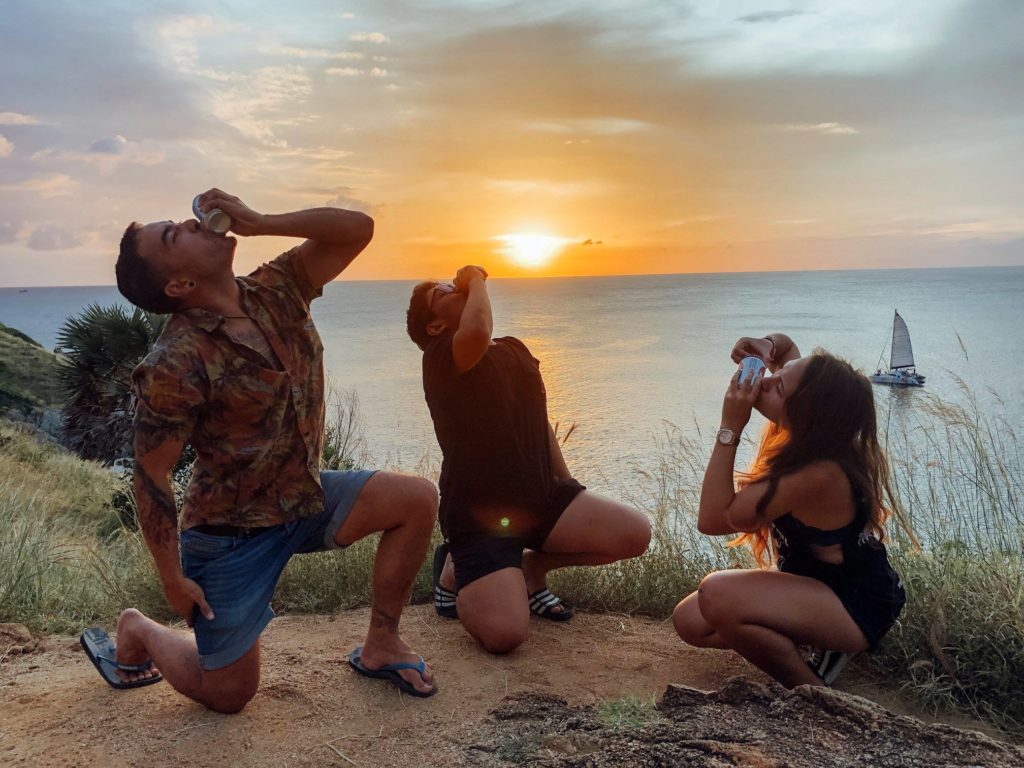
Genup: Sustainability.
Edmund: Sustainability is sometimes my issue. Or pulling back the intensity.
Genup: Who do you admire? Books or people or TV shows, movies that have motivated you?
Edmund: I’ve actually made a goal or resolution or whatever you want to call it this year to not watch TV at all. So far, it’s going quite well. So, I’m not really into TV shows. I’ll tell you what I’m reading currently. Right now, I’m reading Harvard Business Review’s 2020 Management… It’s like top 20 or top 10 management findings. Basically, it’s all the articles and studies that were done at the Harvard Business Review and they pick out the best ones and they put it into a book, and it’s pretty interesting. Kind of the cutting edge of studies that have found new ideas in business or new technology in business or new operating principles or all kinds of stuff. It’s a pretty good book. I find it quite interesting.
Great books that I’ve read. Give me a second, just let me think. Essentialism. That’s a really good book, which basically talks about the idea of breaking everything down, especially in business, to the absolute essentials and not getting distracted by all the noise.
People I admire, which I think is a weird one because I think everyone probably says Elon Musk. I’m not inspired by Elon Musk as in I think necessarily, he’s the greatest business guy in the world. He may be or he may not be. It’ll be interesting to see how history remembers Elon Musk. They’ll either remember him as a genius visionary, or he will go out in flames. And there’s no middle ground for him. But what I think is interesting about him is it has made me realize that you can do anything you want, it’s just a matter of do you have the balls to believe in a crazy, audacious goal. So, you or I could have been the guy building rockets to the moon. There’s no reason we aren’t other than the fact that that wasn’t our idea. I could have been… Or I will be, actually. I’m going to build this massive hospitality company because that’s my vision now. Had you asked me that eight years ago? I don’t think I would’ve had that vision. I opened one hostel. But I think because I look at someone like Elon Musk, I’m like, “Is that guy that much smarter me?” Maybe. Is he that much harder of a worker than me? Doubtful. Is he that much more ambitious than me? Maybe, because of his crazy goals, but is that much more? Is he really that much more smarter than me? I can’t buy that. He’s probably smarter than me. I’m sure he’s an incredibly smart guy. But if you compare apples to apples, then technically yeah. I’m sure he’s probably smarter than me. But if I apply that level to say, hospitality, is there any reason I can’t be at that level in the hospitality business? No there’s not. You have to have the goal and the vision to go that crazy big. And I know that sounds really cocky and arrogant, but it’s what I believe in. I don’t believe there’s that much that separates you, or I, from being on the same level as Elon Musk. I just don’t believe that separation. I believe that separation’s in your head. Not external conditions here on the ground.
It’s a mental thing. So, I’m pretty inspired by him. And then another book that I’ve read that’s really good is called… The author is Verne Harnish. I’m trying to remember what the book is called. And his company is called Gazelles. And the book is called…Give me one second. It’s a very good book everyone should read. This is probably the best business book you can read in my opinion. One of the best. It is called Scaling Up, and basically it just explains in his own words why some companies struggle to get past a certain point and why some companies just take off because of certain operating principles. And he calls those companies that take off Gazelles. And it just kind of breaks that down. It’s quite an interesting book. I read quite a lot. I also made a goal to read more this year, so I’ll have more books in a couple months if you ask me. I used to read a bit of fiction, if it was going to be fiction or literature it was Kurt Vonnegut. I loved Kurt Vonnegut. I’ve read almost everything Kurt Vonnegut’s ever written. I don’t know. I got really into Kurt Vonnegut for a while. I really enjoy his books. Very interesting and abstract, funny ways of writing.

Genup: What don’t you like about being an entrepreneur?
Edmund: What don’t I like? I mean sometimes it’s incredibly stressful. Everything depends on you, so when things are going great, yeah, it’s great. When things are going bad, it’s not very fun. There’s no safety note. It all depends on you, the decisions you make, your work ethic. Which at the same time also makes me look at companies, like back when there was the crash back in 2008, no one ever thought Lehman Brothers would go out of business right? Where are they now? At the top of every big company in the world is someone like you and me, who has the same worries and concerns and stresses that we do every single day.
And I guess that’s one thing, not that I don’t like, but it’s kind of broke it down for me. Like, “Okay I’m not actually that different from these guys.” It actually opened my mind and made this limitless possibility of, “Well, that guy who’s running X, Y and Z, Fortune 500 company is no different from me. He’s worried about the same shit I worry about at night.” But that stuff can be very taxing. Like I said, when the hotel licenses problem happened a couple years ago, that was the worst eight months of my idea. I built this big thing and I was doing great, and then all of a sudden, every single penny that I had saved for five years was gone over night. I mean hundreds of thousands of dollars. I’m not talking insignificant amounts of money. I’m talking massive losses. I didn’t fire any of my employees. I kept everyone around. I paid every single debt. I didn’t run away from my bills. I did right by every single person. I didn’t have to, and a lot of people didn’t around Thailand. A lot of people ran, took the money they had in their bank accounts and left. Especially foreigners. And if I’m honest with myself, I thought about it. I still have on my wall, framed in my bedroom, I had sat down with a piece of paper and I wrote the pros of staying and the cons of leaving, and that’s because I was so stressed out every day. I mean I can’t describe the mental state that I was in. It was horrific. And I wrote down a list of pros and cons of whether to stay or whether not to stay in Thailand. Whether just to take everything and run or to stay. And I wrote out this list and, in the end, the pros outweighed the cons and I wrote out in big letters at the bottom, “Keep fighting.” And I still have it in my room. It’s framed and every day when I wake up I look and it and I’m like, “Just remember, no matter how bad it gets or how hard it gets or how shitty it is, remember A) that that can always happen, where I was. And there’s always a way out. Even when you’re staring at the blackest of black and it looks like nothing good is going to happen, just stick it out a little bit longer and usually you break into the light and things work.” But that’s hard. It’s mentally challenging and taxing.
I think probably for my family, especially my wife and my daughter, I mean my daughter’s so young that probably she doesn’t understand at this point, but I think for my wife at times it is probably hard that I’m an entrepreneur because I’m certain there’s times she’d love if I just hang out and be home more and spend time with her. I think that’s probably it. Just trying to find balance, that’s what I don’t like about being an entrepreneur. I always lean towards working more and building more and doing more, and probably need to balance a little bit better with spending more time with the family and not trying to build everything more quickly and, sustainability.
Genup: What does success in life mean to you?
Edmund: Pretty interesting, about a year ago, through this book Scaling up, also, when I read it I did a one page plan of what I saw in my life in the next 50 years, what I really hope to accomplish. I would say one is a personal wealth goal, which, actually that wealth I don’t need much more than what I have now. I don’t need anything more. I’m really happy. I live a very good, comfortable life. I don’t need any more than what I have. Personal wealth wise, as long as I’m just sustaining what I have now, I’m happy. But I’d like to be able to build a trust and a fund to be able to do philanthropy.
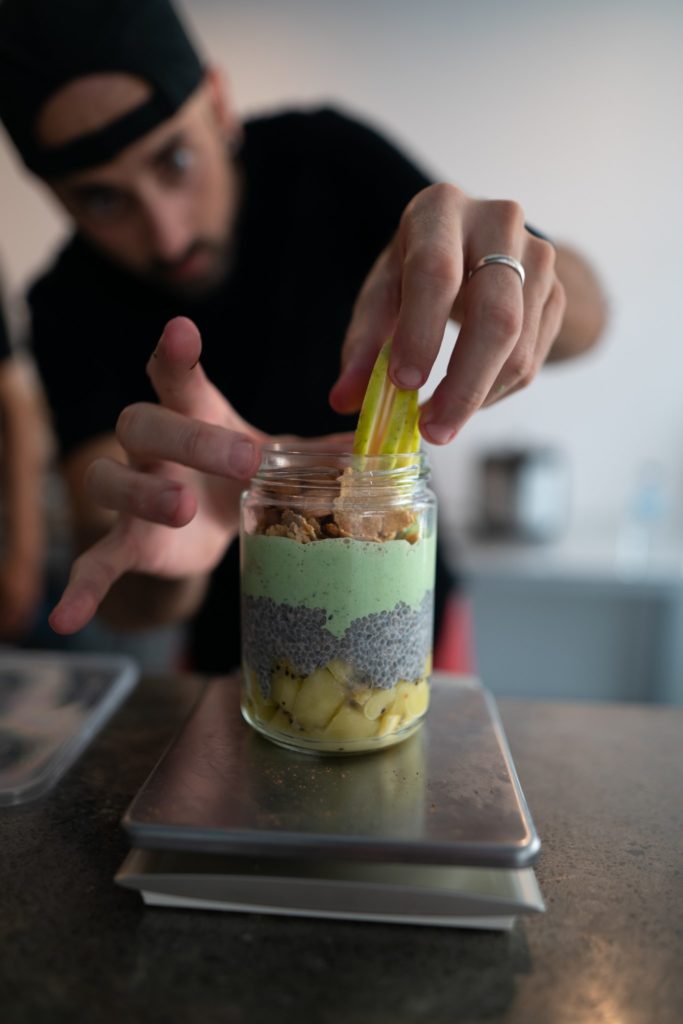
Donate more. That’s always been a big thing in my whole family. From my grandfather all the way down to us, everyone’s always been really big into community service and some kind of philanthropy, so I’d like to do more of that. That excites me and I get passionate about it.
I think just building deeper and lasting relationships with the people that I’m close to already and just making sure that those friendships and those relationships last for a long time. Having those people around me when I am older. I think that’s really important to me. Obviously being able to provide for my family is a huge one. Making sure that my daughter never wants for anything and doesn’t have to worry when she wants to have kids that there’s not money for her to live. That’s really important. I mean, trying to stay healthy. I’ve changed my lifestyle a lot over the last three or four years, and I live a really healthy lifestyle now. Sustaining that, staying healthy, staying focused, I think that’s what it’s all about. Family, health, wealth.
Yeah. But I don’t foresee myself ever retiring. I can’t imagine that. I think a lot of people have, “I want to retire at 50,” or “I want to retire at 60.” “I want to just go travel the world.” That’s not a thing for me. I’ve traveled a lot already. I’ve seen a lot already. I do want to travel here and there, but I’m more excited about building things and working. That excites me. My grandfather’s 98 right now, and he still runs his company every day. And he’s very lucid because of it. Very clear. Speaks clear. Understands what’s happening. And he says to me every time he sees me, “The only reason I’m still alive is because of this company.” It forces me to think. It forces me to be up every day at a certain time, to be focused every day, to have a routine and he says he thinks that’s what’s kept him alive for as long as he is.
Genup: What advice would you give anyone wanting to be an entrepreneur?
Edmund: Don’t. Don’t unless it’s really what’s inside of you. Don’t do it because it sounds cool, because right now it’s a word that everyone’s like, this catchphrase. “Oh, I’m an entrepreneur. My dad’s an entrepreneur. Entrepreneur, entrepreneur, entrepreneur.” I actually say I’m a business owner. I don’t really love the word entrepreneur. I’m a business owner is what I am. Am I an entrepreneur? I guess, by the definition of the word, but it’s such a catchphrase now that people love to say.
It’s so trendy. And I think that’s bad, because I think what’s happening with the word is it’s almost becoming a word where people are going, “Oh well if I’m not that, it’s not good.” Because you see all these kids blogs now. I saw a Facebook ad the other day, this 16-year-old kid, “Let me teach you how to be an entrepreneur.” I’m like, “Really. No offense, but… Yes, I’m sure you can teach me things. I agree. But at 16 years old are you really in a position where you should be teaching other kids about being an entrepreneur?” That seems unhealthy to me. And it seems unhealthy that that’s a thing. I think there are people that have this, and it’s not necessarily an admirable attribute that I have. I would actually argue that I’m a black sheep of society and that I’m a little bit different and I am what I am because I don’t fit in everywhere else. So, for me it’s like, if someone comes in and, “Oh should I be an entrepreneur?” It’s like, “I don’t know is that what’s in your heart? What are you passionate about? Is there something that you’re willing to give away everything and lie on the ground and die for? Then yeah you should be. If not, there’s nothing wrong with being a doctor. There’s nothing wrong with being a lawyer. There’s nothing wrong with being a receptionist at a hotel. There’s nothing wrong with being a cook. Those are all great jobs that people need to do and some people are super passionate about.” I think the biggest advice I would give is don’t trick yourself into going down a path that you’re not passionate about.
I think the world is moving to a different place where I think passion is going to become the new currency. Passion and kindness and empathy. I think my generation, and even your generation that’s a little bit different, I think if you look at what’s happening in the world now, it seems like, because it’s so crazy right now. I mean it’s insane. The only thing that could happen when things are going this crazy, it has to swing back the other way at some point, right?
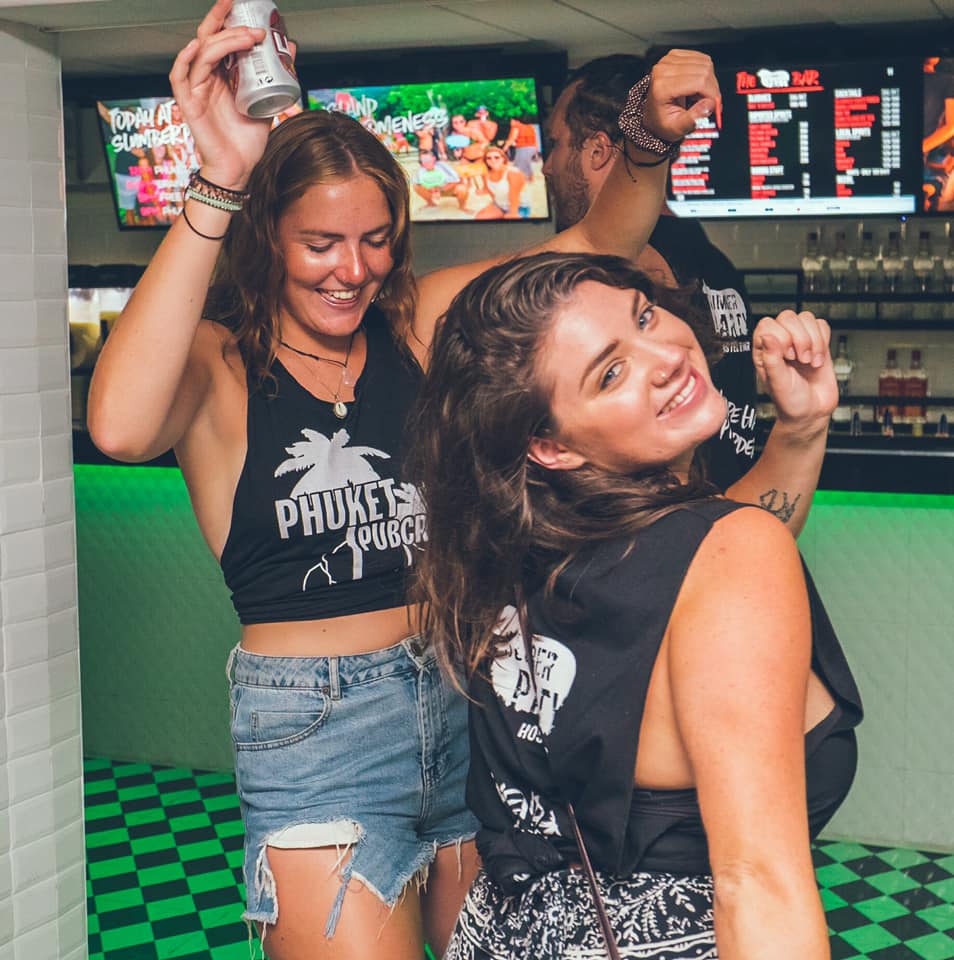
So, if it has swung so far towards chaos, anger, hate, at some point I feel like it’s got to swing back towards passion and empathy and kindness. I think that’s what’s going to happen. But if you look at it, even online this company like Mindvalley. Would Mindvalley have existed 10 years ago? Would people have bought that product? No. But they’re buying it today. That says something that someone like Vishen is able to grow that company, shows that the world is changing. I used to speak there a bunch a couple of years ago.
I used to go down like once a month. They have a thing; I think the event was called Kickstarter. They have an auditorium there. They bring entrepreneurs, from around Asia and I went there a bunch of times and spoke. And I bought him a really nice bottle of wine so ever since then he’s always been really nice to me.
Genup: Where can people find you, learn more about your company?
Edmund: My company, slumberpartyhostels.com. Me personally is edmundlowman.com. I do consulting and speaking things about business turnaround and specifically usually hospitality. So, businesses that are struggling with whatever concept they have out and going into the business and try to figure out what’s going wrong and how they can turn the business around.

But I only take on three clients a year doing that because it does require a lot of time and effort and I’m focused on growing Slumber Party not on growing my consulting business. It’s usually something that I’m passionate about, about what they’re doing, if I am going to do it. So that’s it.
Genup: Thank you so much Edmund.
Edmund: Thank you.
Related posts
Today's pick
Hot topics
Welcome to Generation Upstart
It starts with an idea — a fusion of thoughts and experiences, a blending of desires and dreams. Bursts of electricity fueled with faith, love and creativity leap across synapses generating the necessary expression to give it real form and substance. Sometimes, an entrepreneur’s call…
Careerlist: Never Waste a Crisis
According to Michael Scissons, the most important thing you can do to maximize your chance of entrepreneurial success is to build your tribe. Start as early as possible, trimming and pruning like a patient gardener, while continuing to add value to the network. For these…
RingZero: On Employee Satisfaction and Success
Great people make the great teams that make the great workplaces, and Mr. Asmat Yousri is a big believer in people. After all, he has been at this since 1996. An ex-banker, he saw no obstacles transitioning from a corporate position to an entrepreneur. In…

